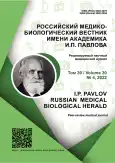Potentials of Minimally Invasive Technologies in Treatment for Early Gastric Cancer
- Authors: Dylenok A.A.1, Rybachkov V.V.2, Malashenko V.N.3, Kashin S.V.2, Shybin L.B.2
-
Affiliations:
- Yaroslavl Regional Cancer Hospital
- Yaroslavl State Medical University
- Yaroslavl State Medical Univercity
- Issue: Vol 30, No 4 (2022)
- Pages: 531-538
- Section: Original study
- Submitted: 22.06.2022
- Accepted: 29.08.2022
- Published: 28.12.2022
- URL: https://journals.eco-vector.com/pavlovj/article/view/108923
- DOI: https://doi.org/10.17816/PAVLOVJ108923
- ID: 108923
Cite item
Abstract
INTRODUCTION: Gastric cancer remains one of the leading causes of oncological morbidity and mortality.
AIM: To determine the effectiveness and safety of wedge resections of stomach in patients with early gastric cancer (EGC) in comparison with endoscopic intraluminal treatment methods.
MATERIALS AND METHODS: Assessment of the immediate and long-term (5 years) prognosis of 164 patients with EGC who underwent wedge resection of stomach and endoscopic intraluminal interventions was performed. One hundred twenty eight patients were operated on in the volume of endoscopic intraluminal mucosal resection or submucosal dissection (the mean age 68.5 ± 9.2 years; men 53.7%). In 36 patients (the mean age 65.3 ± 7.8 years; men 66.7%), according to gastroscopy in combination with chromogastroscopy, narrow-band magnification endoscopy, the tumor dimensions exceeded those recommended for endoscopic methods. Due to contraindications for classic resection interventions in such patients, wedge resections of the stomach were performed.
RESULTS: In the comparison groups there was no postoperative mortality, however, in the group with use of endoscopic methods, complications were noted (perforations of the stomach and bleeding). All the complications were eliminated endoscopically. In the group of wedge resections, there were no postoperative complications, but in the long-term result, the five-year survival rate was lower than in the group of endoscopic treatment (75.0% versus 92.2%; χ2 = 8.10, p = 0.004) due to a more severe comorbid pathology in the patients of wedge resection group.
CONCLUSION: Safety and equal effectiveness of wedge gastric resections was established in the long-term oncological result in patients with EGC in comparison with intraluminal endoscopic methods.
Full Text
About the authors
Aleksey A. Dylenok
Yaroslavl Regional Cancer Hospital
Email: dylenok-onco@rambler.ru
ORCID iD: 0000-0001-8523-8592
SPIN-code: 1668-1724
Russian Federation, Yaroslavl
Vladimir V. Rybachkov
Yaroslavl State Medical University
Email: julia3111@yandex.ru
ORCID iD: 0000-0002-9293-3742
SPIN-code: 3542-0120
MD, Dr. Sci. (Med.), Professor
Russian Federation, YaroslavlViktor N. Malashenko
Yaroslavl State Medical Univercity
Email: malashenko_1957@mail.ru
ORCID iD: 0000-0002-2440-3395
SPIN-code: 4229-9481
MD, Dr. Sci. (Med.), Professor
Russian Federation, YaroslavlSergey V. Kashin
Yaroslavl State Medical University
Email: s_kashin@mail.ru
ORCID iD: 0000-0001-6098-7677
SPIN-code: 3698-6247
MD, Cand. Sci. (Med.), Associate Professor
Russian Federation, YaroslavlLeonid B. Shybin
Yaroslavl State Medical University
Author for correspondence.
Email: lbsh@yandex.ru
ORCID iD: 0000-0003-4562-7731
SPIN-code: 8021-7289
ResearcherId: A-9339-2019
MD, Cand. Sci. (Med.), Associate Professor of the Department of Pathological Anatomy
Russian Federation, YaroslavlReferences
- Kaprin AD, Starinskiy VV, Petrova GV, editors. Zlokachestvennyye novoobrazovaniya v Rossii v 2018 godu (zabolevayemost’ i smertnost’). Moscow; 2019. (In Russ).
- Kashin SV, Ivanikov IO, Burdina EG. Diagnostics of early stomach cancer in polyclinical practice. Kremlevskaya Meditsina. Klinicheskiy Vestnik. 2012;(1):147–53. (In Russ).
- Kuvaev RO, Kashin SV, Nikonov EL, et al. Early stomach cancer: the modern methods for screening, endoscopic diagnostics, and minimally invasive treatment. Russian Journal of Evidence–Based Gastroenterology. 2014;3(3):44–51. (In Russ).
- Ono H, Kondo H, Gotoda T, et al. Endoscopic mucosal resection for treatment of early gastric cancer. Gut. 2001;48:225–9.
- Ko WJ, Kim YM, Yoo IK, et al. Clinical outcomes of minimally invasive treatment for early gastric cancer in patients beyond the indications of endoscopic submucosal dissection. Surgical Endoscopy. 2018;32(9):3798–805. doi: 10.1007/s00464-018-6105-4
- Goto O, Mitsui T, Fujishiro M, et al. New method of endoscopic fullthickness resection: a pilot study of non-exposed endoscopic wall-inversion surgery in an ex vivo porcine model. Gastric Cancer. 2011;14(2):183–7. doi: 10.1007/s10120-011-0014-8
- Mitsui T, Niimi K, Yamashita H, et al. Non-exposed endoscopic wall-inversion surgery as a novel partial gastrectomy technique. Gastric Cancer. 2014;17(3):594–9. doi: 10.1007/s10120-013-0291-5
- Schlag C, Wilhelm D, von Delius S, et al. EndoResect study: endoscopic full-thickness resection of gastric subepithelial tumors. Endoscopy. 2013;45(1):4–11. doi: 10.1055/s-0032-1325760
- Koh JS, Joo MK. Guidelines for Endoscopic Resection of Early Gastric Cancer: Comparison of Japanese and European Guidelines. The Korean Journal of Gastroenterology. 2018;72(2):79–82. doi: 10.4166/kjg.2018.72.2.79
- Seifert H, Fusaroli P, Arcidiacono PG, et al. Controversies in EUS: Do we need miniprobes? Endoscopic Ultrasound. 2021;10(4):246–69. doi: 10.4103/EUS-D-20-00252
Supplementary files










